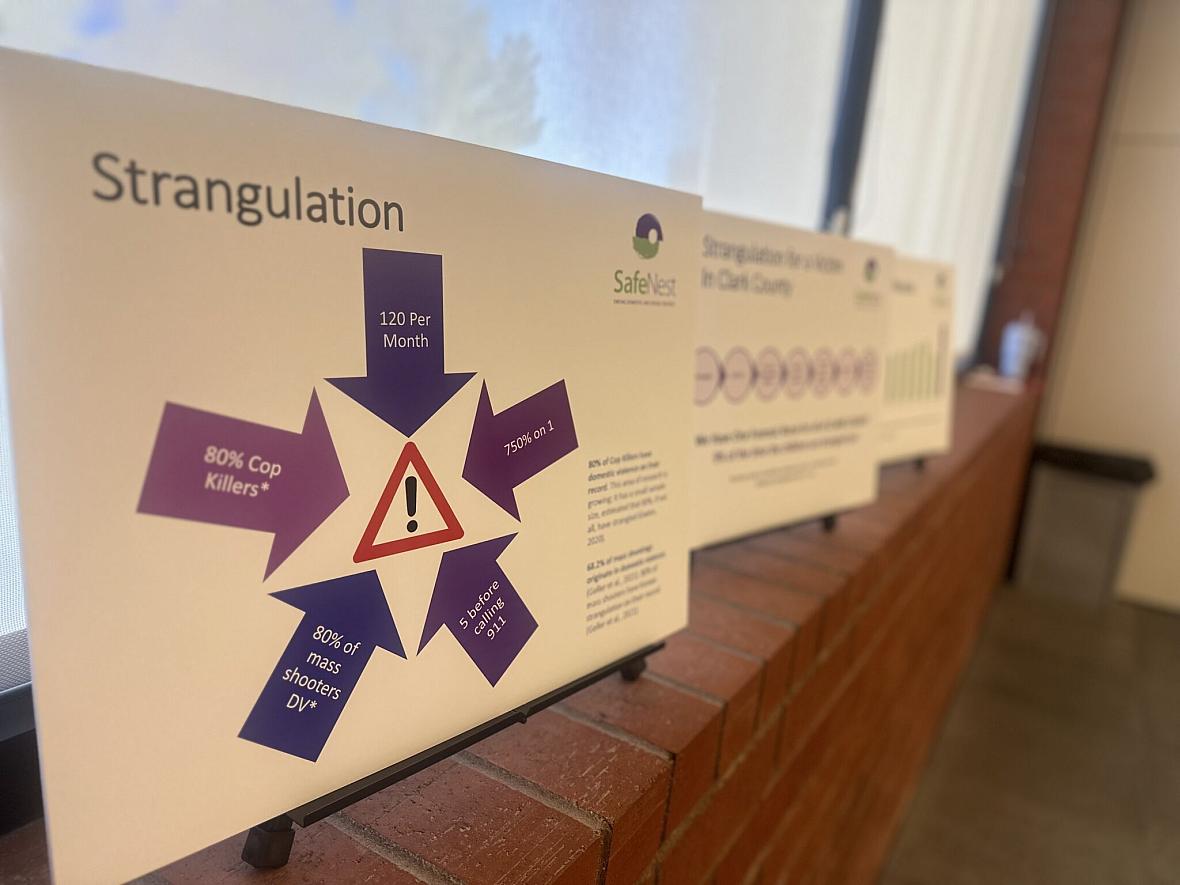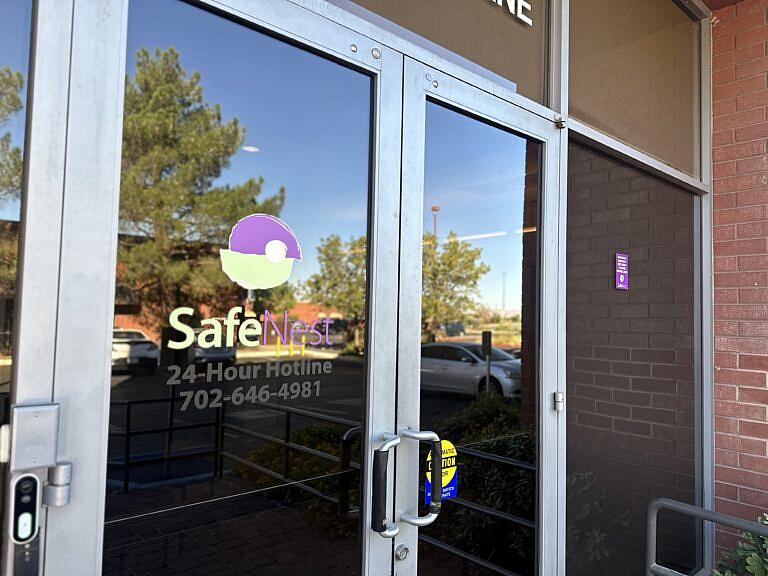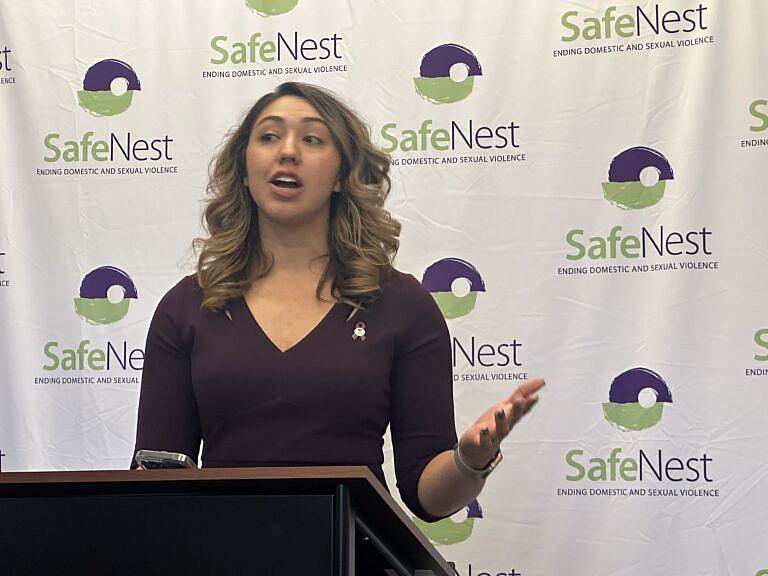Nevada among handful of states funding strangulation exams for domestic violence victims
This project was originally published in Nevada Current with support from our 2023 Domestic Violence Impact Fund.

Materials at a press conference highlighting October as Domestic Violence Awareness Month. Las Vegas, NV. Oct. 5, 2023.
(Photo: Camalot Todd/Nevada Current)
[Advisory: This story includes details of domestic abuse]
As of October 1, Nevada is one of only four states providing free strangulation exams for sexual and domestic violence victims, but the state lacks the health care infrastructure to implement new laws.
Nonfatal strangulations is a key indicator of escalation, with studies showing that it raises the risk of homicide or very serious harm by 7.48 times — despite this, and Nevada’s persistent rank of being in the top 10 states for the highest rates of females killed by males for 25 years, Nevada has no data on strangulation, according to the Department of Health and Human Services (DHHS).
As of 2021, there were a half dozen locations statewide where forensic nurses are licensed to perform the exam. In Southern Nevada, home to roughly 75% of the state’s population, only one facility is equipped to conduct the exams, University Medical Center, the hospital publicly owned by Clark County.
“There’s one in Clark County and that’s an absolute travesty,” Liz Ortenburger, the CEO of SafeNest, the state’s largest domestic violence nonprofit, said.
The other five locations where the exams can be done are in Elko, White Pine, Lincoln, Washoe, and Carson City counties.
For domestic and sexual violence victims, their body is the crime scene. To collect the best evidence for prosecution, it’s recommended that they don’t shower, change clothes, eat, or use the restroom before the forensic exam. For people seeking services in Nevada, the wait times can be longer than 8 hours. If they’re driving from a bordering county into Clark County, the entire process can take days, according to the Nevada Coalition to End Domestic Violence.
“This is solvable,” Ortenburger said. “The problem is that no one raised the curtain and said we’ve got a massive problem here until we started complaining about this pretty vigorously. But we’re not about complaining, we’re about ‘let’s pass the legislation so now it’s funded.’ So we’ve removed that barrier.”
But other barriers remain.
“We know it’s transportation, child care, and just the availability of exams,” Ortenburger said. “Transportation and child care, SafeNest can absolutely cover, but forensic nurses? I cannot create those.”
Assembly Bills 257 and 276 passed in the 2023 legislative session ensured that the cost of a strangulation examination was free to the victim and that they could be performed via telehealth appointments.
Just weeks after the bills passed in May, Nydia Lopez-Garcia, a 37-year-old and mother of three from Mesquite, Texas, was strangled to death at the MGM Grand on the Las Vegas Strip by her ex-husband. Her three children are in the care of her sister until her ex-husband’s case is decided. He was charged with open murder, where the judge or jury decides whether it’s first or second-degree murder or voluntary or involuntary manslaughter.
In the last 10 months, three women, including Lopez-Garcia, have died from strangulation in Clark County, according to the county Office of the Coroner/Medical Examiner.
Siloed services and incomplete data
Each month approximately 120 women and children seek the services of SafeNest, Ortenburger said.
Nationally 9% of children who are victims of family violence are strangled, according to data based on reports often filed by a mandatory reporter such as a teacher or daycare worker. But that estimate likely reflects an undercount; when responding to domestic violence incidents, law enforcement, advocates, or health care staff rarely ask children if they were injured, according to the Training Institute on Strangulation Prevention. Additionally, children are reliant on their parents for booking medical appointments and may not have the language to explain that they were strangled to adults.
Transportation and child care, SafeNest can absolutely cover, but forensic nurses? I cannot create those. Liz Ortenburger, SafeNest
During a review of the domestic violence screening process by medical professionals in Nevada only one out of seven victims were identified by health providers to be victims of domestic violence. In none of those screenings did the victim receive education on the dynamics of domestic violence, resources for victims of domestic violence, or asked if they could be given a warm handoff to a service provider, according to the 2022 case study by the Nevada Office of the Attorney General Committee on Domestic Violence Fatality review subcommittee.
Like the state, neither the Clark County coroner’s office nor University Medical Center (UMC), the lone hospital in Southern Nevada with a nurse licensed to provide strangulation exams, collects strangulation data related to domestic abuse, said Erik Pappa, the director of communications for Clark County.
Over the last 5 years, 24 people have died due to strangulation in Clark County, including Lopez-Garcia, according to the coroner’s office records. The coroner’s report was cross-referenced with news and police reports to confirm Lopez-Garcia’s death was a domestic violence-related strangulation.

SafeNest, the largest domestic violence shelter in Nevada, advocated for free strangulation exams during the 2023 legislative session. Las Vegas, NV. Oct. 5, 2023.
(Photo: Camalot Todd/Nevada Current)
The county’s coroner’s office does not track domestic violence separately as the cause or manner of death, nor could the office cross-reference medical records to indicate if anyone was treated for non-fatal strangulation before death, Pappa said.
A paucity of data dates back to the early history of domestic abuse advocacy. Grassroots organizations in the 1970s and 1980s pushed for judiciary reforms so that nonfatal incidents were addressed legally. These grassroots organizations also provided shelter, services, and hotlines to call for help. But it wasn’t until 1994 when the nation passed the first version of the Violence Against Women’s Act (VAWA) that grant programs and new criminal provisions were established by the federal government to improve the criminal and civil justice systems’ response and direct services to victims, including the creation of the National Domestic Violence Hotline. VAWA has since been reauthorized four times, most recently in 2022.
What remains just over 30 years after the original passage of VAWA is a patchwork of domestic violence nonprofits and advocacy groups that operate in isolation of each other, all providing various services, with their own hours and phone numbers — and no centralized way to navigate them.
“In Nevada, if you’re a victim of domestic violence, the police drop off this pamphlet that has 17 different numbers on it,” Ortenburger said. “How is that helpful? We’re not a large state so the population makes this possible, we absolutely should have one statewide hotline that is capturing this data.”
The impact of the legislative efforts, what’s missing and what’s needed
Finances are a significant barrier for people who experience domestic and sexual abuse to leave those situations. Financial instability also limits access to care needed in the aftermath of physical and sexual abuse. Health care costs for women experiencing abuse are 42% higher than costs for non-abused women, according to the Institute for Women’s Policy Research. In Nevada, the average cost of a strangulation examination is $1,500, posing a significant challenge to people fleeing violence.
AB 257, sponsored by Democratic Assemblywoman Shondra Summers-Armstrong, passed both the Senate and Assembly unanimously, was signed by the governor on June 15, and went into effect on Oct. 1. The bill aims to alleviate that financial burden by requiring the counties that have jurisdiction over where the strangulation was committed to cover the examination costs, and authorizes the county to seek reimbursement from the state General Fund through the Division of Child and Family Services. For fiscal years 2023-2024 and 2024-2025, Nevada allocated $1.08 million to cover the exams.

Democratic Assemblywoman Selena Torres spoke about the two state bills that increase access to strangulation exams at a press conference highlighting Domestic Violence Awareness Month. Las Vegas, NV. Oct. 5, 2023.
(Photo: Camalot Todd/Nevada Current)
“We were prioritizing legislation that keeps the victims of domestic violence safe and allows for them to get access to the health care that they need, and it is critical that it is available in a timely manner,” Democratic Assemblywoman Selena Torres said at a press conference about the legislation on Oct. 5.
But examination fees were only one barrier. The state still needs to address the shortage of providers who could perform the exams.
AB 276 aimed to work around compensating for the provider shortage by allowing exams to be done via telehealth. That legislation was sponsored by Torres and also passed the assembly and the senate unanimously before being signed into law by the governor on May 22, just 6 days before Lopez-Garcia’s death.
“This is going to allow for significantly decreased wait times so it won’t have to take 8 hours in a hospital [waiting for a test] to get the care that you need,” Torres said.
Only half of the victims who are strangled show physical signs, and of those only 15% of victims had injuries that could be photographed, according to the Training Institute of Strangulation Prevention.
Prosecution of non-fatal strangulation cases typically depends on first responders’ collection of evidence, according to a report by the California District Attorneys Association and Training Institute on Strangulation Prevention.
The two bills enacted in Nevada address some immediate needs of strangulation victims. But ongoing challenges include the health care provider shortage and the need to train health care providers in the state on the importance of strangulation exams.
The Nevada Attorney General’s 2022 case study review suggests that every provider in every hospital and tribal clinic in the state should be competent in conducting non-lethal strangulation exams under the International Association of Forensic Sciences standards, but noted that often medical professionals do not have access to strangulation kits in their facilities or are not trained properly to assess a victim of strangulation.
The entirety of the Nevada health care system needs to be trauma-informed, the AG office’s report found, as a health provider’s office or facility is one of the best places to screen a patient for domestic violence, sexual assault, and human trafficking. The report recommends the Board of Nursing and the Medical Board should require trauma training to be completed on par with other continual education requirements.
Ortenburger has had discussions with Clark County on implementing some of these systemic changes.
“I have asked the county — and I think it’s going to move forward — to create a domestic violence advisory council or advisor group so we can get all the players in the room,” Ortenburger said. “We need to get this moving or we’re going to have more and more people walking away and that will mean more and more perpetrators of strangulation not getting a felony offense.”
In the meantime, perhaps a third of the 120 women, children, and victims who experience strangulation each month that SafeNest sees will get an exam, Ortenburger said.

